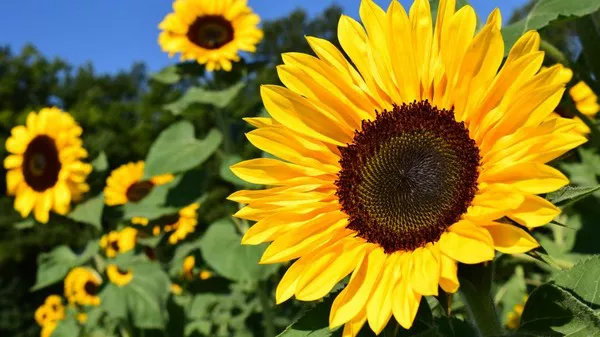Sunflowers, with their vibrant blooms and towering stalks, add a touch of beauty and charm to any garden. However, like all plants, sunflowers are vulnerable to pests that can damage their foliage, stems, and flowers. To ensure your sunflower garden thrives, it’s essential to implement effective strategies for pest prevention and control. In this comprehensive guide, we will explore various methods to keep pests away from sunflowers.
The Importance of Pest Prevention
Pests can wreak havoc on sunflowers, causing stunted growth, deformed blooms, and even plant mortality. Prevention is key to maintaining a healthy and thriving sunflower garden. By identifying potential pest threats and implementing preventive measures, you can protect your sunflowers from infestations and reduce the need for more aggressive pest control methods.
1. Choosing Resistant Sunflower Varieties
Start your pest prevention efforts by selecting sunflower varieties known for their resistance to common pests. Some sunflower varieties naturally possess traits that make them less appealing to pests or better equipped to withstand pest pressure. Look for varieties labeled as “pest-resistant” or “disease-resistant” when purchasing sunflower seeds or seedlings.
2. Creating a Healthy Garden Ecosystem
A well-balanced and diverse garden ecosystem can naturally deter pests and promote beneficial insects that prey on common pests. Follow these steps to create a healthy garden ecosystem:
Companion Planting: Integrate companion plants known to repel pests or attract beneficial insects. Marigolds, for example, are known to deter aphids and other harmful insects.
Encourage Predatory Insects: Plant flowers like daisies and yarrow to attract beneficial insects such as ladybugs, lacewings, and praying mantises, which feed on common sunflower pests.
Provide Birdhouses and Feeders: Attract birds to your garden, as they can help control pest populations by feeding on insects and larvae.
3. Regular Inspection and Monitoring
Frequent inspection and monitoring of your sunflower plants are vital for early pest detection. Regularly check for signs of pest damage, such as holes in leaves, chewed stems, or wilting flowers. Early intervention can prevent pests from establishing large populations and causing extensive damage.
4. Handpicking Pests
For smaller infestations, handpicking pests off the sunflowers can be an effective control method. Look for caterpillars, aphids, and other insects that may be feeding on the plant. Wear gardening gloves and pick off the pests, disposing of them far from your sunflower garden.
5. Homemade Pest Repellents
Several homemade pest repellents can help protect your sunflowers from pests without resorting to harsh chemicals. Here are a few examples:
Garlic Spray: Blend garlic cloves with water and strain the mixture. Dilute the garlic-infused water with additional water and use it to spray your sunflowers. Garlic spray is known to deter many pests.
Neem Oil Spray: Neem oil is a natural insecticide and repellent. Mix neem oil with water and a small amount of dish soap to create an effective spray that can deter pests like aphids and caterpillars.
Hot Pepper Spray: Blend hot peppers with water, strain the mixture, and use it to create a repellent spray. The capsaicin in hot peppers can deter pests from feeding on your sunflowers.
6. Using Beneficial Nematodes
Beneficial nematodes are microscopic organisms that can be applied to the soil to control soil-dwelling pests like root maggots and cutworms. These beneficial nematodes attack and kill the pests without harming your sunflowers or other beneficial organisms.
7. Physical Barriers
Physical barriers can be effective in protecting sunflowers from certain pests. Consider using the following barriers:
Row Covers: Use row covers to shield young sunflower seedlings from pests like birds and insects until they are large enough to withstand minor damage.
Netting: Install netting around sunflowers to prevent birds from feasting on the seeds once they mature.
8. Organic Pesticides
When preventive and natural methods are insufficient to control pests, consider using organic pesticides as a last resort. Organic pesticides are derived from natural sources and are less harmful to beneficial insects and the environment. Examples include insecticidal soap, neem oil, and pyrethrin-based products.
9. Regular Weed Control
Weeds can attract pests and provide hiding places for insects that may eventually move to your sunflowers. Regularly remove weeds from your garden to reduce the risk of pest infestations.
10. Proper Watering
Overwatering can attract certain pests and lead to root rot, which weakens the sunflower’s ability to defend against pests. Water your sunflowers appropriately, allowing the soil to dry out between waterings.
11. Maintain Soil Health
Healthy soil promotes vigorous plant growth, making your sunflowers more resilient to pest attacks. Regularly amend the soil with organic matter, such as compost, to enhance soil structure and nutrient availability.
Conclusion
Keeping pests away from your sunflowers is essential to ensure their health and beauty throughout the growing season. By choosing resistant varieties, creating a balanced garden ecosystem, and implementing preventive measures, you can reduce the risk of pest infestations. Regular inspection and monitoring, along with appropriate control methods like handpicking pests and using homemade repellents, will help protect your sunflowers without harming beneficial insects and the environment. Remember to always consider the safety of beneficial organisms and the overall health of your sunflower garden when addressing pest issues. With proper pest prevention and control, your sunflowers will thrive, gracing your garden with their radiant blooms and providing a haven for pollinators and other beneficial insects.


